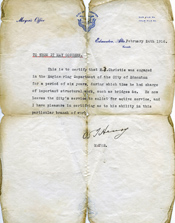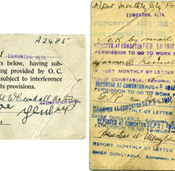Civilian Hardships
Government regulations increased in many areas during the war. As the conflict continued, inflation and home front shortages took their toll on Edmonton’s workers and families. Many on fixed incomes – not just older people, but the wives of soldiers – found it very difficult to make do. Eventually the government introduced rationing to ensure that the scarce resources were shared more equitably. Censorship, restrictions on movement (like curfews) and alcohol consumption, and income taxes were also put in place across Canada during the First World War. Adherence to those interventions were secured by the use of propaganda and exploiting of patriotic fervour.
The City and the War Effort
City employees who enlisted were able initially to request a leave of absence from their positions and still receive half of their pay, which was sent to their wives. Unfortunately, as the war dragged on, the City found this was unsustainable. Later in the war, the spouses of former City workers could apply for assistance in cases of hardship which would be considered by the Councillors and the Finance Committee to see if relief could be arranged.
Edmonton’s City Council frequently received and granted requests to support charities which were contributing to the war effort. City Councillors tried to help those who were helping the war efforts through initiatives like free space for training and transportation on the streetcars for soldiers awaiting deployment, to grants to cover the utilities and light bills for the Red Cross, the Imperial Order Daughters of the Empire and the Cadet Corps.


![51st Battalion [EA-254-2]](/sites/default/files/public-files/images/EA-254-2_WM.jpg)
![Colours Ceremony [EA-29-38]](/sites/default/files/public-files/images/EA-29-38_WM.jpg)
![Trenches at Edmonton Exhibition [EA-45-1113]](/sites/default/files/public-files/images/EA-45-1113_WM.jpg)

